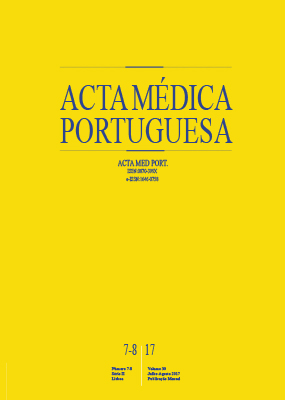Diabetes: Socioeconomic Inequalities in the Portuguese Population in 2014
DOI:
https://doi.org/10.20344/amp.8235Keywords:
Diabetes Mellitus, Healthcare Disparities, Literacy, Portugal, Socioeconomic FactorsAbstract
Introduction: Diabetes is a major public health problem and it is related to socioeconomic factors. The aim of this study is to describe socioeconomic inequalities in the distribution of diabetes in the population with 25 years or more, resident in Portugal in 2014.
Material and Methods: Data from the Health National Survey 2014 was analysed, n = 16 786. We estimated the prevalence of diabetes in the population and stratified by socioeconomic variables namely educational level and income. The extent of socioeconomic inequalities was assessed using concentration index and the relative index of inequality.
Results: Diabetes was found to be concentrated among the people with lower educational levels (concentration index = -0.26) and lower income quintiles (concentration index = -0.14). Relative index of inequality also showed a lower degree of inequality among the most educated (0,20; CI 95% = [0,12; 0,32]) and with higher income (0,59; CI 95% = [0,48; 0,74]).
Discussion: Distribution of diabetes is associated with education and income. Previous studies have shown that although income might reflect lifestyle patterns, education reflects better social factors that are important for establishing healthier behaviours. Also, the National Health Service, of universal coverage and free of charge, might have contributed to reduce inequalities in the access to health by those with the lowest income.
Conclusion: Supporting ‘Health in All Policies’ might reduce inequalities, namely by improving population educational level and actions that promote health literacy.
Downloads
Downloads
Published
How to Cite
Issue
Section
License
Copyright (c) 2017 Acta Médica Portuguesa

This work is licensed under a Creative Commons Attribution-NonCommercial 4.0 International License.
All the articles published in the AMP are open access and comply with the requirements of funding agencies or academic institutions. The AMP is governed by the terms of the Creative Commons ‘Attribution – Non-Commercial Use - (CC-BY-NC)’ license, regarding the use by third parties.
It is the author’s responsibility to obtain approval for the reproduction of figures, tables, etc. from other publications.
Upon acceptance of an article for publication, the authors will be asked to complete the ICMJE “Copyright Liability and Copyright Sharing Statement “(http://www.actamedicaportuguesa.com/info/AMP-NormasPublicacao.pdf) and the “Declaration of Potential Conflicts of Interest” (http:// www.icmje.org/conflicts-of-interest). An e-mail will be sent to the corresponding author to acknowledge receipt of the manuscript.
After publication, the authors are authorised to make their articles available in repositories of their institutions of origin, as long as they always mention where they were published and according to the Creative Commons license.









